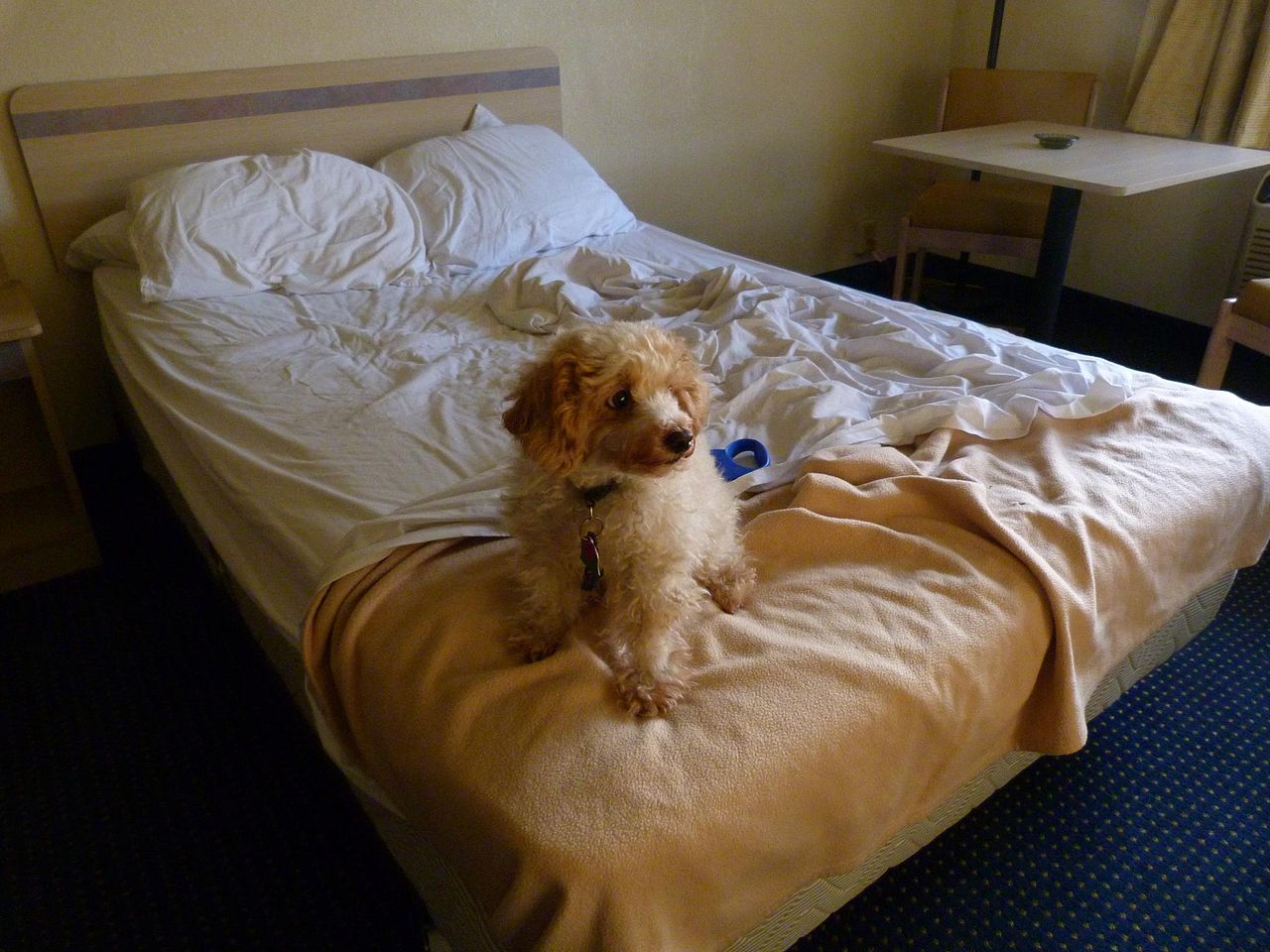
Many dog owners have faced the situation when they notice a wet stain on their bed when they come home. This unpleasant situation may lead to frustration and overreaction in most owners. Before we lose our nerves and start yelling at our furry friends, we need to consider what may have caused this behavior and what we can do to prevent it in the future. Instead of showing verbal or physical aggression towards our paw friends, we need to take a breath and act rationally.
In this article we will let you know about the possible reasons on why your dog pees on your bed and what actions you can take to prevent this behavior and keep your bed dry.
When You Have a Puppy
If you just got your new pup, you should not be surprised by these kinds of unpleasant situations. Puppies do not have any tracking background, they have not obtained any social and obedience skills yet and most importantly- they do not have potty training at the time they enter your home. The younger a dog is, the more often he/she will need to go outside for a potty break. Puppies are likely to relieve themselves every 2-3 hours. So, do not be surprised, if you were unable to walk your pup outside, and it releases its bladder on your bed at home.
What is the solution in this situation?
Since we are talking about a pup, the best solution might be potty training or crate training.
You need to make a schedule on when your pup will eat, will play, will rest, and when there will be a potty break time. Moreover, you can add exercises to the schedule so that your pup can learn basic tasks like “sit”, “stay”, “come”...etc. The younger a dog is, the more easy it will be for you to train him/her to perform new tasks and obtain new skills. If stick to the schedule, your pup is likely to learn to hold its bladder soon and relieve itself only at a certain time of the day, and your bed will remain in the same perfect condition as it was before. You can keep records of how many times your dog has relieved him/herself during the day. If you are unable to take him/her for a walk as many times as he/she may need, you can contact a dog walker in your area.
Please note, that if you want to provide more advanced training, you need to wait for your pup to get at least 8 weeks old and avoid training it too difficult tasks. At a very young age the bone structure in dogs has not developed yet, and your pup may get injured.
A common reason for why your dog pees on your bed could be anxiety.
Anxiety
If your dog is too afraid of a certain object, person or place, this could make him/her release his/her bladder on an inappropriate place in your home like your bed.
How to handle this issue
You can try avoiding the object/person/place that leads to stress and anxiety in your dog. Your canine is likely to associate a certain object with a negative experience from the past, he/she might have got scared from fireworks or other loud noises at a certain place. A person in your inner circle may remind him/her (through their smell or the way they talk) of a person he/she does not like. The first step towards correcting this behavior is to avoid any factors, that may be stressful for your dog. You can expose your canine to these factors gradually so that he/she can get used to them. Moreover, you can give your dog treats and connect these to the object/person/place your dog does not like. The idea behind it is to make your dog associate these factors with positive experience. Step by step your canine is likely to change his/her attitude and the level of anxiety may decrease.
Another possible reason of why your dog pees on your bed could be related to overexcitement.
Overexcitement
You both might have been separated for a long time and your dog is likely to get overexcited when you come home. On the other hand some canines tend to be hyperactive and try to find ways to spend their excessive amount of energy. Peeing on your bed may be just a way for your dog to handle his/her hyperactivity.
What can you do in this situation?
If your canine is very happy to see you again after a long time spending separated, you are not likely to be able to do anything about that. However, if we talk about a hyperactive dog, there are some steps you can take to interfere with this behavior.
First, do not encourage it. Do not give your dog treats, and do not praise him/her when he/she misbehaves. Reward the calm behavior, so that he/she learns that he/she will be praised and rewarded only if he/she behaves well. The best thing you can do is to ignore the hyperactive behavior and redirect it. You can figure out more challenging games for your furry friend, that he/she will be engaged in during the day. Go for a walk with your canine, so that he/she can explore the surroundings and spend his/her energy while outdoor. Keeping both the mind and the body of the dogs fit is really important for them to stay healthy. Furthermore, they will stay motivated to fulfill the commands you give.
We all know that dogs have a strong sense of smell. You can use this knowledge to provide different scents like lavender that have a calming effect on your canine. If you are not sure what scent you should use, we would recommend threcommend contacting.
You always need to remember, that dogs feel their owner’s emotions. If you want to have a calm dog, first you need to be a calm owner.
A possible reason on why an adult dog starts peeing on the bed is marking his/her territory.
Territorial Marking
What to do in this case
If your dog has not been neutered/sprayed, and you notice that he/she starts peeing on your bed or different places in your home, you may need to neuter/spray him/her. This topic is still controversial among the pet owners as it has to do with ethical problems. We would recommend that you neuter/spray your dog, as this will have many benefits. It will reduce the possibility for certain health issues to occur. It is less possible for male dogs to develop prostate disease and testicular cancer. Neutering a male dog may affect positively his/her behavior and make him/her less aggressive and better behaved. Spraying a female dog may decrease the risk of developing mammary tumors and infection of the uterus. Neutering/spraying a dog may prevent them from roaming and being exposed to many risks while outside unsupervised.
We move to the point when you have read and exclude all the reasons listed above as the cause for your dog’s behavior and namely- peeing on your bed.
If you are an owner of an adult dog and your furry friend suddenly starts peeing on your bed, this may be caused by a health issue.
Health Issues
What to do in this case
We would recommend that you contact a veterinarian as soon as possible so that they can determine if there is a health issue and how it can be treated.
Incontinence is a common health issue in old dogs, that may be caused by disease, medications or old age. Your veterinarian will prescribe proper medication, so please do not try to give your dogs medicament without consulting a medical professional first.
What Actions Can You Take To Keep Your Bed Dry?
The easiest way to keep your bed in perfect condition is to prevent your dog from having access to it. Just make sure that the door is closed/locked so that your dog can not enter the room while you are not at home.
Another “trick” you can use is to put a leash on your canine and give a command “sit”, “stay”, “wait” or “lie down”. The leash can be used as an additional helping tool in case that your dog disobey. Please keep in mind that you need to be gentle. Do not put too much pressure as the leash is only a helping tool and your dog should not get afraid of it.
You can also try using dog diapers or potty pads to keep your bed dry. Another way to “save” your bed is by using a waterproof mattress cover.
It is really important for any pet handlers to monitor the behavior of their beloved paw friends to ensure that they are ready to act when a problem arises. We would recommend that you contact a veterinarian as soon as possible if you think that your pet may have a health issue.












